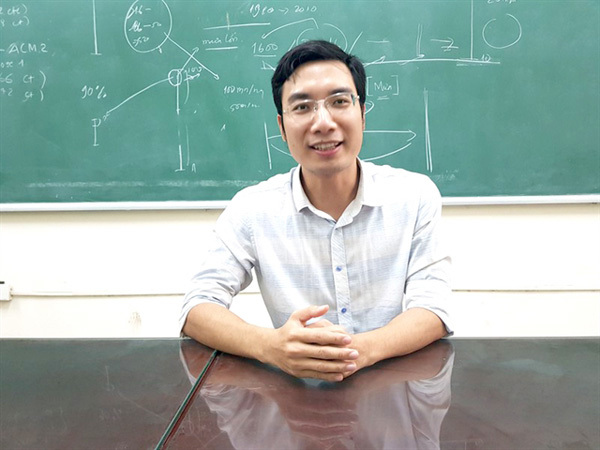 |
| Bui Minh Tuan believes that hydrometeorology sector is an interesting discipline and offers many opportunities for young people to be truly passionate about natural sciences. — Photo kienthuc.net.vn |
Tuan, 33, specialised in research on rain forecast over a period of 10 - 90 days during his studies for a master's degree at the Hanoi University of Natural Sciences.
“Rain is an extremely important factor for the development of most countries in the world including Vietnam. If rainfall is too heavy, it can lead to flooding, causing serious damage to people and materials. But too little rainfall can cause drought, a lack of water for drinking and can destroy crops. Therefore, rain forecasting is always the top concern of meteorologists around the world,” said Tuan.
The meteorological sector in recent years has seen strong development. Weather forecasts for five days have the same accuracy as one-day forecasts of 30 years ago. But, Tuan said, this does not mean that in the next 30 years, the forecasts will be five times more accurate.
“There are big obstacles that the meteorological industry has not been able to overcome. Technically, a computer can help to make forecast bulletins that cover a month or longer, however, the reliability of the forecast will drop very quickly after five or seven days,” Tuan told vietnamnet.vn.
Currently, theoretical foundations for short-term forecasting, from one to five days, have been gradually finalised. Therefore, weather forecasts for this time period are relatively good. However, atmospheric changes on a longer time scale, from 10 to 90 days, are not fully understood. This is also one of the main reasons why the forecast is not reliable at this time.
Those concerns have prompted Tuan to study changes in rainfall patterns from 10 to 90 days, towards expanding the accuracy of forecasts.
From 2013 to 2019, Tuan tackled a number of issues, including the cyclical fluctuations of rainfall in Vietnam and how these relate to climatic regions.
Tuan said it took him a year to read and understand the algorithms and build computation programmes for large atmospheric data sets over the course of 30 years, in the 1980-2010 period.
“These are complex algorithms, requiring high programming skills. But due to the lack of support from information technology specialists, I have had many difficulties in dealing with this problem,” said Tuan.
After the computational results have been obtained, analysing the physical process based on those results is also a challenge.
The reason is that Vietnam's climate is very complicated, affected by many large circulation systems and has strong differentiation between regions. The characteristics of rain and the mechanism of precipitation in the country still causes a lot of controversy in the meteorological community. Therefore, selection of important aspects for analysis also requires a lot of time.
Tuan took another year to analyse the results. What he collected during this time helped uncover the oscillation pattern of rain. The physical mechanisms involved in this volatility have also been shown.
He found a relationship of this oscillation with the occurrence of heavy rain in Vietnam. This brings a lot of value, because heavy rain is considered anomalous and difficult to predict. Tuan's research is an important theoretical basis to expand the ability to predict rain and heavy rain from 10-25 days.
Thanks to these results, by early 2019, his article was published in the Journal of Climate - a climate magazine of the American Meteorological Association.
But, Tuan still says there is loneliness in science.
“The computer system was there, but to improve, the human factor is a prerequisite. In Vietnam today, the number of people who choose to follow the research path in this field is very small,” he said.
The meteorology industry still seems to be "out of the general trajectory of development", when after nearly 10 years, despite some changes, it is still slow and only motivated by a few individuals. There are not many people doing research in the same field, so it is very difficult to find an academic exchange.
Part of the reason, Tuan thinks, is that the support for young researchers is still relatively low compared to the general level of society. This will likely lead to a crisis in high-quality human resources in the future.
Currently, each training course in his faculty recruits only about 30-40 students. While majors require people who are good at math, physics or programming, very few people choose meteorology.
The young lecturer said that the industry was still not respected because people think this sector is mostly theoretical. But in fact, it has a huge impact on the life, economy and society, such as planning production activities, forecasting diseases and preventing natural disasters.
"I hope in the future, society will know more about the hydrometeorology sector. This is an interesting discipline and offers many opportunities for young people to be truly passionate about natural sciences,” said Tuan.
The Ta Quang Buu Award, started in 2015, is the award of the Ministry of Science and Technology, annually held to encourage and honour scientists with outstanding achievements in basic research in the fields of natural sciences and engineering, contributing to promoting Vietnam's science and technology integration and development.

 Previous page
Previous page Back to top
Back to top







